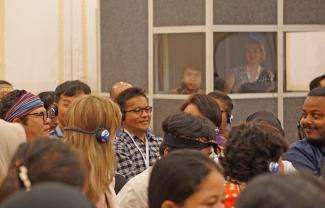From 28 May – 2 June 2023, the Asia Learning Exchange on Social Inclusiveness and Youth in Tenure Reform Processes was held in Bali, Indonesia. Attended by members of Indigenous groups and organisations from around the world, the event offered a chance to listen, learn, be inspired, discuss and coordinate on how to best advance different aspects of tenure security in the wider context of Asia.
The Asia Learning Exchange was co-organised by the Coalition for Tenure Justice in Indonesia (TK), the International Land Coalition (ILC), the Samdhana Institute and the Tenure Facility (TF). Over several days, it explored ways to enhance the inclusion of women, youth and marginalised groups in securing tenure rights, with communities in Indonesia as a case study.
Attendees came from Nepal, India, Kyrgyzstan, Cambodia, Timor-Leste, the Philippines, Thailand and Bangladesh. Together, they participated in an event schedule that combined a mix of community visits, plenary activities, breakout sessions, workshops, Q&As, roundtable discussions, reporting from the field and an experience fair.
Field visits and knowledge sharing
The first three days of the event were taken up with visits to communities in Bali and East Java, coordinated by ILC members and TF partners in Indonesia: the Alliance of the Indigenous Peoples of the Archipelago (AMAN), the Ancestral Domains Registration Agency (BRWA), the Agrarian Reform Consortium (KPA) and Sajogyo Institute (SAINS).
On the first day, the delegation visited the Buleleng Peasant Union in Sumber Klampok village and Sumber Makmur Peasants Union in Pemuteran village, Buleleng, Bali; on the second, they met the Dalem Tamblingan Indigenous Peoples in Alas Mertajati, Buleleng; on the third day, they joined the Pancer Local Community in Sumberagung, Banyuwangi, East Java.
During each visit, delegates discovered how communities are organising and mobilising themselves around progressive agrarian reform strategies and developing new approaches to land management, with an emphasis on women and youth involvement. They also gained an insight into the struggles faced by each community, from land disputes with a copper mining company to encroachment by illegal loggers and degradation of ancestral lands.
Key lessons learned
Following the field visits, delegates returned to their base at Prama Sanur Hotel Bali. Here they began a series of conferences, plenary sessions and workshops, during which they shared their experience of visiting with communities and compiled a series of key takeaways.
“I would like to apply lessons learned from this event for my community,” said Ms. Sreynang Khen (Ms. Pisey) from Cambodia. “Especially, I would like to train our youth group to have a common goal, strengthen their solidarity and build stronger commitment in order that youth in the community understand the importance of community development and the land rights struggle.”
Another participant, from Thailand, Mr. Siwakon, visited Sumber Klambok village and Permuteran village. Key takeaways from his visit related to optimising agricultural systems with organic farming initiatives, improving land productivity and promoting sustainable practices. For Mr. Siwakon, the most impactful element of the visit was the power of collectivism in the communities he met.
“What I learned from this event is that mass movement is comparatively not very strong in Thailand,” explained Mr. Siwakorn after the visit. “Therefore, I really would like to work on this and also work with Thailand Indigenous organisations,” he added.
Evaluating the Event
The Asia Learning Exchange on Social Inclusiveness and Youth in Tenure Reform Processes proved to be a valuable experience for community leaders and activists from around the world. For those engaged in environmental conservation and land rights activities, the exchange illuminated a range of initiatives focused on conservation, women and youth empowerment, and advocacy.
Through a combination of field visits and conferences, participants were able to see first-hand how communities in Indonesia are struggling to secure their land rights while also building a more sustainable way of life based on inclusivity and youth engagement.
The event proved to be a source of inspiration to all in attendance, many of whom formulated ideas to carry home to their own communities. Most importantly, the learning exchange experience built bridges between Indigenous Peoples throughout Asia, separated by distance but united in their shared experiences and commitment to land tenure reform.




